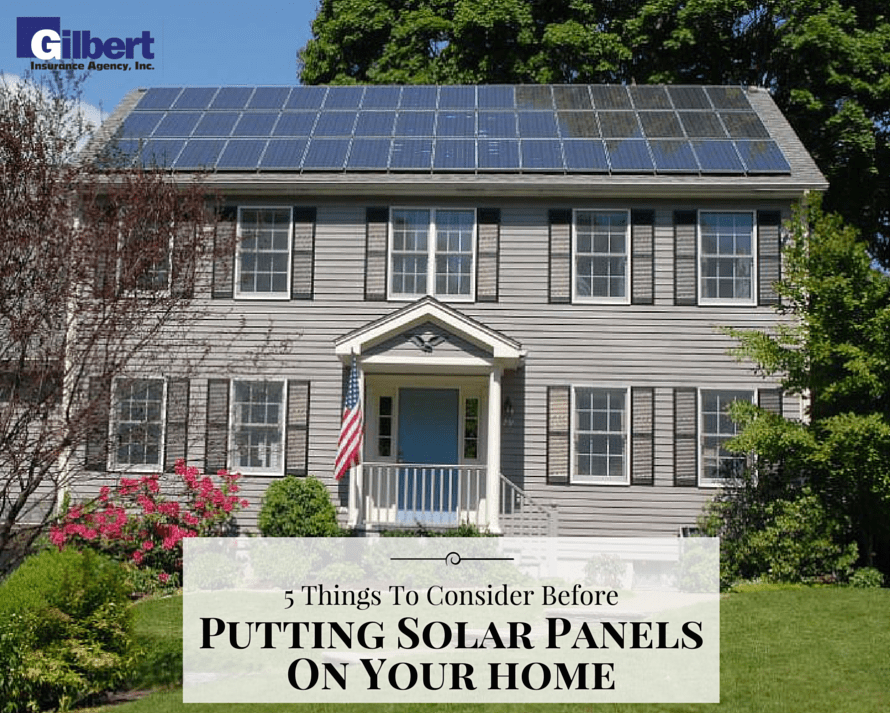
5 Things To Consider Before Putting Solar Panels On Your Home
There are approximately 16,000 homes in Massachusetts today that have solar panels, and that number is expected to double in just a few years. Why is the solar craze heating up so quickly? In part, it’s due to some exciting news for homeowners from the federal government.
In a highly unexpected move, the feds preemptively extended the 30% investment tax credit for installing a Solar PV (Photovoltaic) System through the end of 2018, an extra two years!
However does the growing popularity of solar and the appealing investment credit mean that you should install solar panels on your home? There are more layers to this decision than you may think.
To go solar or not to go solar is a tricky question. Here are five things to consider before making your final decision to go solar.
- Are You Ready to Get Your Solar Panel Project Started Sooner Than Later?
The extension of the tax credit deadline is good news for homeowners who are considering a solar PV system, but have not yet taken the leap. However, while it’s true that installation does not have to be completed until the end of 2018, many experts recommend initiating construction as soon as possible. A solar panel system is a fairly complicated construction project. There are several additional time-sensitive criteria you will need to meet to get the investment credit, including:
- Your utility company has to approve connecting the system to the grid.
- You need to have pre-operating tests that demonstrate the equipment works and you have to prove ownership of the system.
- You must also have purchased the system, either outright with cash or through financing; leased equipment is not eligible.
- The Solar PV system must be new or being used for the first time; the credit only applies to the “original installation” of the equipment.
This doesn’t mean you should rush into your buying decision just to meet a tax incentive deadline, but the new deadline will be here before you know it.
- The Difference Between Buying Or Leasing A Solar PV System –Which Will Fit Your Needs Best?
Buying
More and more homeowners are investing in solar, expecting to save up to 25% off their energy bills. However buying a solar PV system is not a cheap proposition. The cost will depend on the size of your home and square footage of your roof, but for the average home solar panels could cost $30,000 or more. Many buyers feel the upfront investment will be worth it to take advantage of federal tax credits, state tax credits, and other local rebates.
Leasing
Other homeowners are deciding to lease a Solar PV system. This is an attractive option for many because it negates the upfront costs but still delivers energy savings. However this type of relationship can get complicated and homeowners should proceed with caution when leasing.
Here are a few tips on how to avoid surprises and confusion throughout the Solar Panel leasing process:
- Carefully read the lease contract and make sure you understand which party – you or the lessor – is responsible for various costs and situations.
- Should your home and panels be damaged by wind, fire or another similar misfortune, remember to file two claims, one with your home insurance company and one with the solar panel leasing company.
- Be aware that in signing the lease contract you are essentially giving the leasing company financial interest in your home. This may make things complicated if you want to sell your home, get a home equity loan, or get a reverse mortgage. Channel 7 News Boston did a story that is a good resource for homeowners considering a lease.
- Lease contracts also have many different terms and you, or your lawyer, should investigate all of them. Will you be able to move the system to a new home and at what cost? Will future buyers of your home be obligated to assume your contract with the leasing company? Does the leasing company have the right to approve the transfer of ownership?
- If you lease a system, you do not qualify for the federal tax credit. However, you may be able to take advantage of Massachusetts state tax credits and any local incentives.
A great resource to consult is the Massachusetts homeowners guide to solar leases, loans, and power purchase agreements (PPAs). This comprehensive document will help you make a more informed decision about financing or directly buying your solar panel system.
- Are You Aware of the Safety Concerns Related to Solar Panels?
Homeowners should be aware of these five hazards related to having a solar paneled roof:
- Increased potential for injury – It’s easy to trip over solar panels, wires or other system-related equipment.
- Electrical shock – Solar panel power is stored in batteries that channel a lot of electricity, so if a person hits one of these panels while on the roof there is significant risk of shock.
- Solar panels produce energy even when shut off – During the daytime, the panels pull energy from the sunlight, and at night, they are drawing from street lamps and other lights. So even when the power has been turned off, anyone working on the roof should remain cautious because it doesn’t mean the panels aren’t conducting electricity.
- Additional Weight – If a fire starts in an area of the house that is below the roof, like an attic, there is an added concern that the roof could collapse because the structure is already weakened by the extra bulk of the solar panels.
- Roof ventilation issues – In case of fire, the best way to ventilate a home is right over the affected area, but if there are solar panels blocking that part of the roof, emergency personnel could have to move to a less effective place to ventilate.
To prepare for your solar PV installation and prevent mishaps, it is a good idea to place a prominent sign on your property that states that your home has solar PV panels and where they are located. Also, make sure to include the location of the receptive batteries and the solar panel shutoff on the signage.
- Do You Know How To Find A Qualified Installer?
This can be the most challenging part of your solar buying process, and also the most important. Here is advice from Gilbert Insurance on how to make a wise decision:
- Hire only the highest caliber technicians who have expertise, licenses and insurance, an established track record, and a great reputation in the market.
- Solicit multiple quotes from solar panel installers that meet the above criteria.
- Always check references. However don’t just talk to previous customers about their experience; ask the installer to actually show you some of the systems they’ve installed.
The North American Board of Certified Energy Practitioners’ (NABCEP) Solar PV Installation Professional Certification is a highly recognized standard of professional certification for installers. Should a company not have a NABCEP-professional on their crew, please be especially diligent in checking their customer reviews.
- Should You Discuss Your Solar Panel Plans With Your Insurance Agent?
Your insurance agent may not sound like someone you would consult on a project like this, but making that call or setting up a meeting with your agent is a critical step in your process. Similar to enhancing your home with a back deck or an updated kitchen, when you add solar PV panels to your roof you will most likely need to increase the amount of your homeowners insurance coverage. In the event of a catastrophe, like fire or severe storm damage, you want your insurance coverage to provide for the cost to rebuild your entire home including replacement of the solar panel system. Speaking with your insurance agent will ensure that you are properly covered.
As you can see there is a lot to think about. Gilbert Insurance is here to help you be more effective in your decision-making process. Visit our website at gilbertinsurance.com or give us a call at (781) 942-2225 for assistance.
